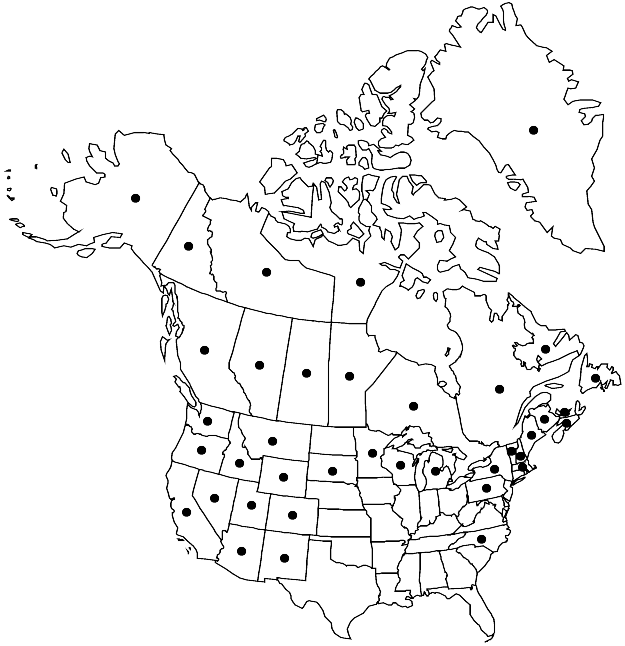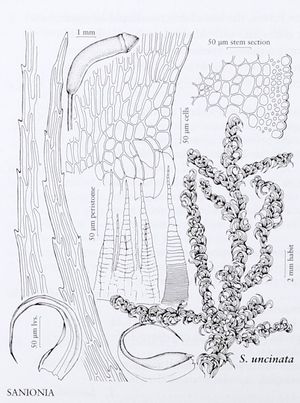Sanionia uncinata
Hedwigia 46: 309. 1907.
Plants small to medium-sized. Stems ± pinnate. Stem-leaves circinate, falcate, or rarely ± straight, plicate or strongly plicate, rarely not plicate, 0.4–1.1 mm wide; base rounded-triangular or ovate; margins plane or rarely partly recurved distally, denticulate or finely denticulate distally; apex long or very long-acuminate; costa in bottom of shallow, wide-angled fold (or not in fold); alar region transversely triangular, transition to supra-alar cells sudden, supra-alar cells quadrate to rectangular, chlorophyllose, walls thin or slightly incrassate, eporose, region equal in size to or smaller than alar region; apical laminal cells with distal ends occasionally prorate abaxially. Perichaetia with inner leaves gradually narrowed to apex, margins finely denticulate to denticulate distally, apex long-acuminate. Capsule horizontal or rarely erect to inclined; exothecial cells ± isodiametric, in 1–3 rows; exostome unspecialized, teeth long, broad basally, border widened at transitional zone in pattern of external tooth; endostome unspecialized, in recently dehisced capsules pale, brownish to yellowish, basal membrane constituting 36–45% total endostome height, processes perforated only along midline, cilia well developed.
Habitat: Forests, open habitats, rock, logs, stumps, trees, soil, mires
Elevation: low to high elevations
Distribution

Greenland, Alta., B.C., Man., N.B., Nfld. and Labr., N.W.T., N.S., Nunavut, Ont., P.E.I., Que., Sask., Yukon, Alaska, Ariz., Calif., Colo., Idaho, Maine, Mass., Mich., Minn., Mont., Nev., N.H., N.Mex., N.Y., N.C., Oreg., Pa., S.Dak., Utah, Vt., Wash., Wis., Wyo., s Mexico, South America, Eurasia, Africa, Atlantic Islands, Pacific Islands (New Zealand), Australia, Antarctica
Discussion
Sanionia uncinata is the only North American species of the genus with a perfect peristome and usually curved and horizontal capsules. When the shoot is examined from the dorsal side, the leaves of normally developed shoots appear to be combed, with leaves pointing stiffly, obliquely forwards-outwards; weak plants growing in relatively dry situations on rocks or tree stems may have less distinctly combed leaves that are sometimes non-plicate or almost so. From all except S. symmetrica, S. uncinata is separated by the structure of the alar and supra-alar cells. Sanionia uncinata is usually somewhat smaller and more regularly pinnate than S. orthothecioides.
The identity of Hypnum uncinatum var. plumulosum Bruch & Schimper [Drepanocladus uncinatus var. plumulosum (Bruch & Schimper) Warnstorf] is somewhat unclear because no type material seems to be extant; most of the North American material referred to this name belongs to typical Sanionia uncinata. Type material of Hypnum (Harpidium) moseri Kindberg (Hypnum uncinatum subsp. moseri) could not be found among material of Kindberg in Stockholm. However, since this taxon should differ from S. uncinata mainly in its non-plicate leaves, and non-plicate leaves occur in some expressions of the latter, it is unlikely to represent a separate taxon.
Selected References
None.
Lower Taxa
"narrower" is not a number."broad" is not a number.
